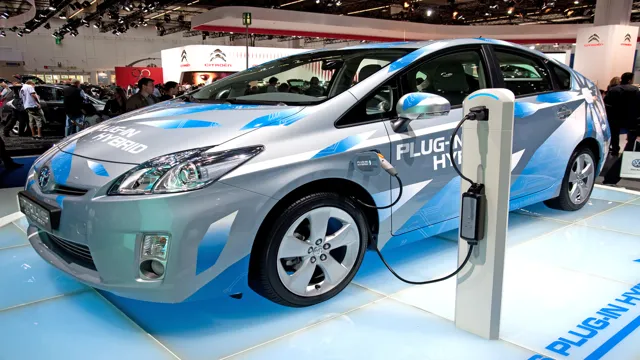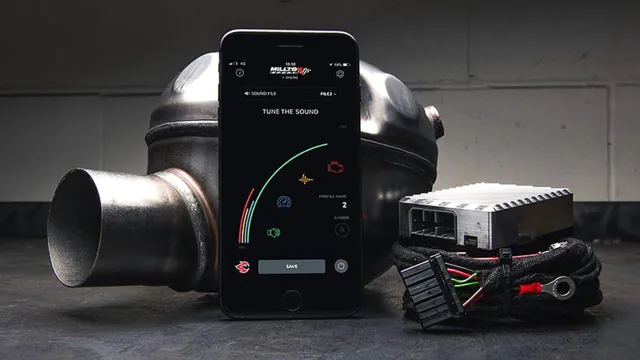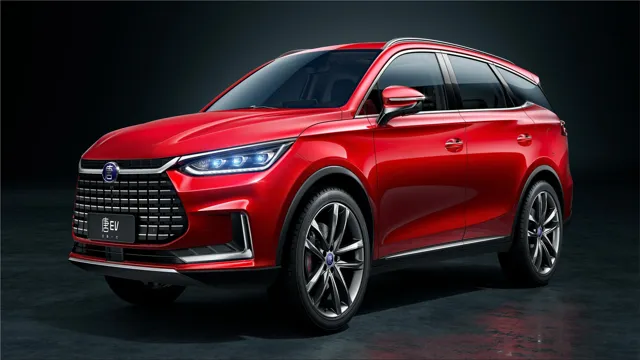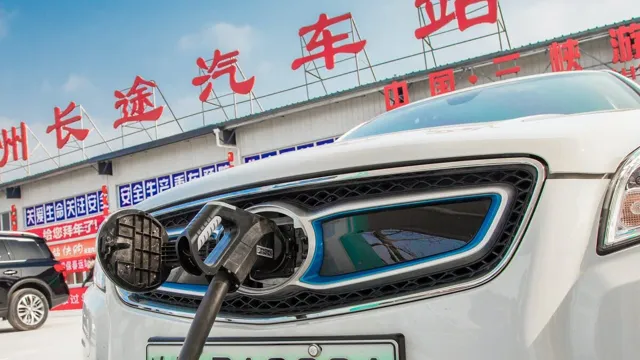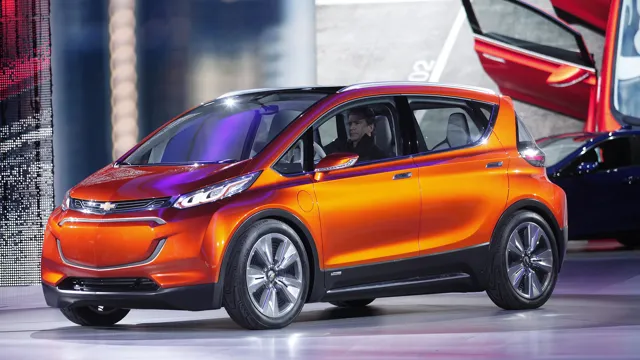Revolutionizing the Auto Industry: Latest Updates on Electric Car News
If there is one thing we can all agree on, it’s that the auto industry is changing at a rapid pace. With the rise of electric cars, there is a lot of buzz and excitement around the future of the industry. Whether you are a car enthusiast or a casual driver, keeping up with the latest news in the world of electric cars is crucial to stay ahead of the curve.
The good news is that the past few years have seen some exciting developments in this area, with many new electric car models being released, and some major players entering the market. From Tesla to Ford, manufacturers are investing heavily in this technology. However, this is just the beginning, as the industry is set to grow exponentially in the coming years.
In this blog, we will be exploring all the latest news and trends in the electric car industry. We will be discussing everything from new models to government initiatives that are encouraging the adoption of electric cars. Additionally, we will highlight the benefits of electric cars, which range from reduced emissions to improved efficiency.
Whether you are considering purchasing an electric car or just interested in learning more about this exciting market, this blog will provide you with all the latest news and insights that you need. So, buckle up, and get ready to take a ride through the exciting world of electric cars!
Top EV Models
The automotive industry has been abuzz with news about electric cars in recent years, and for good reason. Some of the top EV models are revolutionizing the way we think about transportation. The Tesla Model 3 has become a standout in the market, thanks to its impressive performance and range.
With a starting price of just over $35,000, it’s also one of the more affordable electric options on the market. The Chevrolet Bolt is another popular choice, offering up to 259 miles on a single charge. It’s also one of the more spacious EVs, with plenty of room for passengers and cargo.
Meanwhile, the Nissan Leaf has undergone some major upgrades in recent years, with an extended range of up to 226 miles. As the auto industry continues to shift toward electrification, the competition among EV models is sure to ramp up even more.
Sales figures & market trends of popular EVs
As the demand for eco-friendly vehicles continues to rise, more and more automakers are expanding their lineup of electric vehicles. Among the most popular EV models currently available in the market are the Tesla Model 3, the Nissan Leaf, and the Chevrolet Bolt. In terms of sales figures, the Model 3 leads the pack, with over 500,000 units sold worldwide as of March 202
The Leaf is not far behind, with over 500,000 units sold since its launch in 20 Meanwhile, the Bolt has sold around 100,000 units as of 202 These three models have a significant share in the EV market, with the Model 3 alone accounting for over 15% of the global EV market share.
It’s no surprise that these models have become a popular choice for eco-conscious drivers looking for cost-effective and environmentally friendly options for their daily commute. The high sales figures of these models are a sign of the growing demand for EVs, an indication that more drivers are choosing to switch to electric vehicles. With new models set to enter the market in the coming years, the EV market is sure to see more growth and innovation in the future.
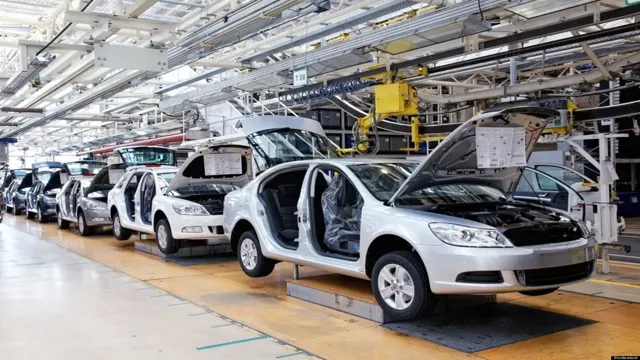
Feature highlights & reviews of upcoming models
As the world shifts towards cleaner and greener forms of transportation, electric vehicles (EVs) are excitedly taking the center stage. EVs not only offer a smooth and silent driving experience but are also cost-effective, environmentally friendly, and require less maintenance. In the upcoming year, the EV market is expected to skyrocket with several state-of-the-art models hitting the streets.
One among them is the Tesla Model S Plaid, famous for its insane acceleration and top-tier performance. With a range of up to 390 miles, the Model S Plaid offers breathtaking luxury with a 17-inch infotainment display and self-driving hardware that enables automatic lane changing. Another noteworthy EV to look out for is the Volkswagen ID.
4, an SUV that combines spaciousness, agility, and efficiency. The ID.4 boasts an impressive 260-mile range, and with its refined interior and cutting-edge technology, it’s sure to leave a lasting impression.
It’s no surprise that Rivian R1T is another much-awaited EV set to make a blaze in the market. The R1T is a fully electric pickup truck, offering impeccable off-road capabilities and making it perfect for outdoor enthusiasts. Rivian’s R1T can travel up to 300 miles on a single charge, and with its 800 horsepower and quick acceleration, it’s truly in a league of its own.
With such tech-forward models on the horizon, it’s clear that 2022 will be an exciting year for the EV industry.
Impact on the Auto Industry
The auto industry has been impacted significantly by the rise of electric vehicles. As more and more people are becoming environmentally conscious, the demand for electric cars has surged. This shift has resulted in traditional car manufacturers having to pivot their business models to incorporate this new technology, resulting in exciting new developments in the industry.
However, it has also led to intense competition, as newer players enter the market. With advancements in battery technology, many auto manufacturers have been able to extend the range of their electric cars, which was previously a major hinderance to its adoption. Additionally, the number of plug-in charging stations has increased, making it easier for electric car owners to charge their vehicles on the go.
However, this shift has also resulted in some challenges for the industry as a whole. It has required a complete overhaul of the manufacturing process, which has required significant capital investments, resulting in lower profitability. Overall, the rise of electric cars has been a net positive for the industry, leading to exciting new developments, but it remains to be seen how this shift will shape the industry in the years to come.
EVs impact on traditional automotive companies
The rise of electric vehicles (EVs) is having a significant impact on traditional automotive companies. Many manufacturers are investing heavily in EV technology to keep pace with the shift away from fossil fuel-powered cars. This change has caused a flurry of activity in the industry as companies race to develop and market their own EV models.
Some automakers have struggled to adapt to this new market and have seen declining profits as a result. Others have embraced the change and are thriving in this new era of transportation. The demand for EVs is growing rapidly, and those companies that can keep up with the trend will have a significant advantage moving forward.
In addition, the push towards EVs has led to new partnerships and collaborations between automakers, battery manufacturers, and technology companies. Overall, the transition to electric vehicles is having a transformative effect on the auto industry.
Investments & partnerships in the EV market
The impact of investments and partnerships in the EV market has been tremendous in the auto industry. Major automakers have been pouring billions of dollars into electric vehicle technology to meet the growing demand from environmentally-conscious consumers. Companies like Tesla, Rivian, and Lucid have changed the game with their innovative designs and cutting-edge technology, but the big players in the industry, such as General Motors and Ford, are also making significant investments to stay competitive.
These investments and partnerships have not only led to more efficient and more affordable EVs but also created a ripple effect throughout the entire industry, with suppliers and manufacturers adapting to this new shift in demand. The EV market is growing, and as more investments are made, the industry will only continue to evolve, leading to a more sustainable future for transportation.
Future predictions & challenges for the auto industry
The auto industry is on the brink of a revolutionary era. The increasing demand for autonomous and electric vehicles has been a significant driver of these changes. The rise of autonomous cars raises concerns about liability, cybersecurity, regulations, and legal implications.
The increasing market penetration of EVs will significantly reduce the use of traditional gasoline-powered vehicles, leading to a dramatic decrease in emissions. This development will also have a significant impact on the oil industry and transportation infrastructure. The successful integration of autonomous cars and EVs into society will require significant investments and synergistic collaboration across different industries.
However, the potential benefits such as improved safety, reduced pollution, and increased efficiency could reshape the landscape of the automotive industry.
Government Policies
The auto industry has been buzzing with news of electric cars and government policies to promote their adoption. The push towards electric vehicles is part of the larger effort to combat climate change and reduce carbon emissions. Governments around the world are offering various incentives to encourage consumers to buy electric cars, such as tax credits and subsidies.
Additionally, some cities are implementing policies to restrict or ban the use of traditional gas-powered cars in certain areas. Despite the challenges and initial costs associated with electric cars, it seems that the future of the auto industry is moving in a greener direction. As consumers become more aware of the environmental benefits and cost savings that come with electric cars, we can expect to see an even greater shift towards this technology in the coming years.
Electric car incentives & subsidies by region
When it comes to buying an electric car, the government policies in your region can make a big difference. In many countries, governments offer incentives and subsidies to encourage people to buy electric cars. These can include tax credits, rebates, and exemptions from certain fees and charges.
These policies vary widely from region to region. For example, in the United States, the federal government offers a tax credit of up to $7,500 for buyers of new electric vehicles. Many states also offer additional incentives, such as rebates and exemptions from sales tax.
In Europe, many countries have similar incentives, such as tax breaks and exemptions from registration fees. China, which is the world’s largest market for electric cars, also offers substantial subsidies to buyers and manufacturers of electric vehicles. So if you’re considering buying an electric car, it’s worth doing your research to see what incentives and subsidies are available in your area.
These can make a big difference in the cost of buying and owning an electric car, and can make it a more attractive option for many people.
Changes in environmental regulations & emissions standards
Thinking about the current environmental conditions, governments worldwide have imposed strict regulations on companies and industries. These regulations are a useful way to ensure environmental safety and reduce emissions, causing minimal damage. Companies must comply with these regulations, or else they may face hefty fines and penalties.
However, frequent changes in environmental regulations can be difficult for businesses to keep up, and it may require additional resources and technology to meet new standards. Governments are continually looking for new ways to protect the environment, promoting sustainable practices and green initiatives that benefit both the environment and the economy. Companies that proactively implement these changes in accordance with government policies will be on the right track to reduce their carbon footprint and operate sustainably.
Charging Infrastructure
The rise of electric cars has brought about new challenges for the auto industry, one of which is the need for a robust charging infrastructure. For many drivers, the fear of running out of battery while on the road is a major deterrent from purchasing an electric vehicle. However, the good news is that the industry is starting to invest heavily in charging networks.
Major automakers are collaborating with charging providers to expand their networks, while governments are incentivizing the deployment of chargers in public spaces. This push for more infrastructure is helping to bolster consumer confidence in electric vehicles, making the transition to a zero-emissions future smoother and more accessible. As the industry continues to evolve, the auto industry electric car news will likely feature exciting new advancements in charging technology and infrastructure, making electric vehicles a more attractive option for drivers around the world.
Conclusion
In conclusion, it seems that the auto industry is charging full-speed ahead towards an electric future. With major players like Tesla, VW, and Ford all investing heavily in battery technology and electrics, it’s clear that the combustion engine’s days are numbered. The transition won’t be easy, but with eco-conscious consumers clamoring for cleaner options, it’s a move that makes both environmental and financial sense.
So get ready to plug in and buckle up, because the electric age is upon us, and it’s infinitely more electrifying than any petrol-fueled era that’s come before.”
FAQs
What is the current state of the auto industry’s electric car market?
The auto industry’s electric car market has seen significant growth in recent years, with more manufacturers investing in electric vehicle technology and expanding their lineups.
Which automakers are leading in the production of electric cars?
Tesla has long been a leader in the electric car market, but other automakers such as Nissan, GM, and Ford are also investing heavily in electric vehicle technology.
What are some of the benefits of owning an electric car?
Electric cars are more environmentally friendly and cost less to operate than traditional gasoline-powered cars. They also typically require less maintenance and offer a quieter driving experience.
What are some of the challenges facing electric car adoption?
Electric cars often have a higher upfront cost than traditional cars and may require additional investment in charging infrastructure. Range anxiety and concerns about the availability of charging stations are also common barriers to adoption.

